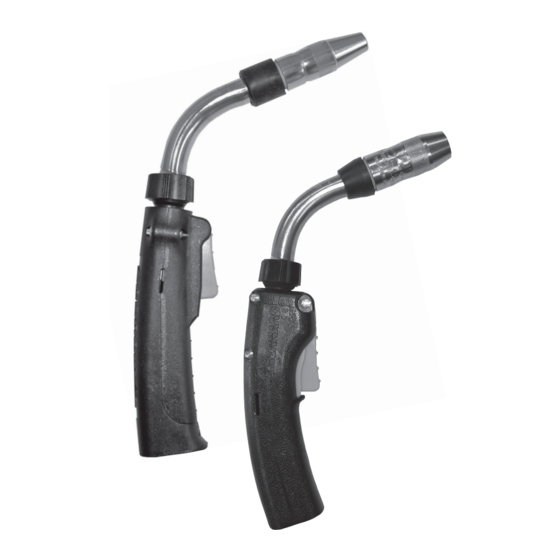Miller Bernand PipeWorx MIG Gun Betriebshandbuch - Seite 4
Blättern Sie online oder laden Sie pdf Betriebshandbuch für Zubehör für das Schweißen Miller Bernand PipeWorx MIG Gun herunter. Miller Bernand PipeWorx MIG Gun 21 Seiten.

1-3 California Proposition 65 Warnings
WARNING: This product can expose you to chemicals
including lead, which are known to the state of California to
cause cancer and birth defects or other reproductive harm.
1-4 Principal Safety Standards
Safety in Welding, Cutting, and Allied Processes, American Welding
Society standard ANSI Standard Z49.1. Website: www.aws.org.
Safe Practice For Occupational And Educational Eye And Face
Protection, ANSI Standard Z87.1, from American National
Standards Institute. Website: www.ansi.org.
Safe Practices for the Preparation of Containers and Piping for
Welding and Cutting, American Welding Society Standard AWS F4.1
from Global Engineering Documents. Website:
www.global.ihs.com.
Safe Practices for Welding and Cutting Containers that have Held
Combustibles, American Welding Society Standard AWS A6.0 from
Global Engineering Documents. Website: www.global.ihs.com.
National Electrical Code, NFPA Standard 70 from National Fire
Protection Association. Website: www.nfpa.org and
www.sparky.org.
1-5 EMF Information
Electric current flowing through any conductor causes localized
electric and magnetic fields (EMF). The current from arc welding
(and allied processes including spot welding, gouging, plasma arc
cutting, and induction heating operations) creates an EMF field
around the welding circuit. EMF fields may interfere with some
medical implants, e.g. Pacemakers. Protective measures for
persons wearing medical implants have to be taken. For example,
restrict access for passersby or conduct individual risk assessment
for welders. All welders should use the following procedures in
order to minimize exposure to EMF fields from the welding circuit:
1. Keep cables close together by twisting or taping them, or
using a cable cover.
2. Do not place your body between welding cables. Arrange
cables to one side and away from the operator.
For more information, go to www.P65Warnings.ca.gov.
Safe Handling of Compressed Gases in Cylinders, CGA Pamphlet P-
1 from Compressed Gas Association. Website: www.cganet.com.
Safety in Welding, Cutting, and Allied Processes, CSA Standard
W117.2 from Canadian Standards Association. Website:
www.csagroup.org.
Standard for Fire Prevention During Welding, Cutting, and Other
Hot Work, NFPA Standard 51B from National Fire Protection
Association. Website: www.nfpa.org.
OSHA, Occupational Safety and Health Standards for General
Industry, Title 29, Code of Federal Regulations (CFR), Part
1910.177 Subpart N, Part 1910 Subpart Q, and Part 1926, Subpart
J. Website: www.osha.gov.
SR7 2020–02
3. Do not coil or drape cables around your body.
4. Keep head and trunk as far away from the equipment in the
welding circuit as possible.
5. Connect work clamp to workpiece as close to the weld as
possible.
6. Do not work next to, sit or lean on the welding power source.
7. Do not weld while carrying the welding power source wire
feeder.
About Implanted Medical Devices:
Implanted Medical Device wearers should consult their doctor and
the device manufacturer before performing or going near arc
welding, spot welding, gouging, plasma arc cutting, or induction
heating operations. If cleared by your doctor, then following the
above procedures is recommended.
4
